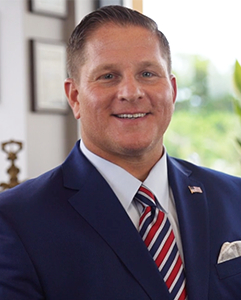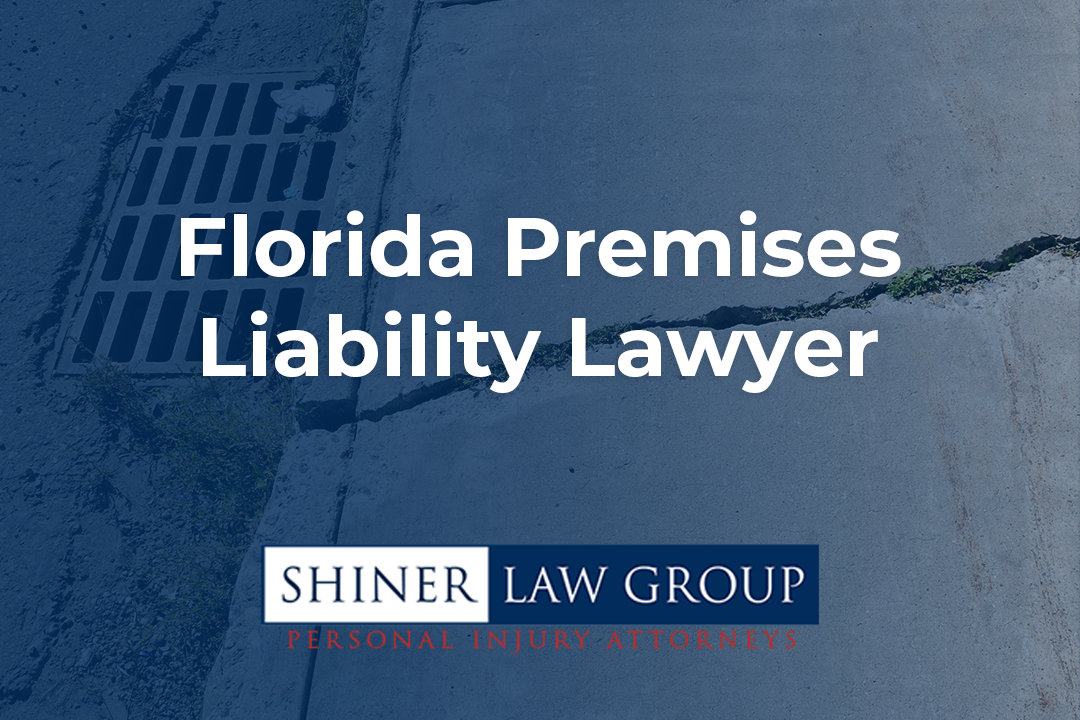 Were you recently injured in a premises liability accident in Florida? Our experienced Florida premises liability lawyers at Shiner Law Group are ready to help fight for your legal rights and get the compensation you deserve. Call us today at (855) 462-6878 to speak with an attorney for a 100% free consultation.
Were you recently injured in a premises liability accident in Florida? Our experienced Florida premises liability lawyers at Shiner Law Group are ready to help fight for your legal rights and get the compensation you deserve. Call us today at (855) 462-6878 to speak with an attorney for a 100% free consultation.
You may be entitled to seek compensation for medical bills, loss of income, pain, and suffering, and more. Contact our Florida law offices to discuss the legal options that might be available to you following your premises liability accident. The next steps are very important. Let Shiner Law Group help you with your premises liability case today.
Were You Injured In A Premises Liability Accident In Florida?
When you’re hurt on someone else’s property, you may chalk it up to a clumsy accident. Even if it wasn’t intentional, your injury may have been caused by someone else’s negligence. Failure to maintain the premises properly could lead to unsafe conditions. Property owners may be responsible for slips and falls, animal attacks, security issues and other accidents that occur on their property. The injured party could be eligible to receive compensation. A Florida premises liability lawyer can help you determine whether you have a case.
What You Should Know About Florida Premises Liability
The person who owns, leases or manages a private or commercial property is obligated to keep the area in reasonable condition. It should be free of known hazards that could contribute to accidents. If a known threat causes an accident, the injured person may be able to file a premises liability claim.
This is a type of personal injury claim or lawsuit. The individual filing the claim must prove that certain elements existed and contributed to their accident.
All accidents that occur on someone else’s property are not eligible for premises liability compensation. The injured party, or plaintiff, must demonstrate that the person who owned or controlled the property knew about the danger and neglected to remedy or eliminate it before it caused the injury.
In other words, you can’t sue for premises liability of a grocery store if you slipped on water immediately after another customer spilled it. The property owner likely didn’t know about the spill and wouldn’t have had time to clean it up before you fell. On the other hand, you may have a legal case if you slipped on water from a chronic leak that the property owner has known about but hasn’t repaired.
Types of Florida Premises Liability Accidents
Slips and falls are common injuries that are associated with negligence. There are many other types of incidents that can lead to a premises liability claim, including:
- Dog bites and animal attacks
- Swimming pool accidents, including drownings
- Accidents on elevators and escalators
- Fires
- Burns
- Flooding
- Assaults
- Amusement park accidents
- Foodborne illnesses
- Snow and ice accidents
- Negligent security incidents
- Malfunctioning alarms
- Chemical spills
- Toxic fumes
- Deck and dock collapses
- Sharp objects and unprotected materials
- Unavailable escape options
Who Could Be Held Responsible in a Premises Liability Claim?
At first glance, the person who legally occupies or controls the property is usually considered liable. If the property is abandoned, the last person to occupy it with the aim of controlling it may be responsible. When those variables don’t apply, the liability falls on the party that is legally authorized to control the property.
A landlord or property owner is ultimately responsible for what goes on in a residence or commercial space. If they have leased the property, they should include clauses in the lease agreement that establish or transfer liability to the tenant.
The details of the case determine where the responsibility lies. For example, the landlord is often contractually responsible for maintenance and repairs. Let’s say that the tenant reports an electrical issue, but the landlord fails to correct the problem. If a guest is injured in a related electrical fire, the landlord may be held liable.
On the other hand, imagine that the tenant left a rake and shovel on the front steps after doing yard work. If their grandmother trips on the tools while entering the home for a visit, the tenant is probably liable.
The types of properties that may be involved in a premises liability claim include:
- Private homes
- Apartment or condominium complexes
- Hotels and motels
- Bars and restaurants
- Stores and malls
- Amusement parks and arcades
- Sporting and concert venues
- Parking lots and garages

Who Can File a Florida Premises Liability Claim?
The person who brings about a premises liability claim is the plaintiff. This is someone who has been injured on someone else’s property as a result of that party’s negligence.
The plaintiff’s rights vary depending on their reasons for being on the property. There are three classifications for visitors to another person’s property:
- Invitees – These individuals are expected to visit the property for business reasons and include customers at a store or clients of a company.
- Licensees – These guests are invited to the property for social reasons, such as a party. This category also includes unexpected visitors, such as an individual who is walking on the street in front of your yard when your dog escapes and bites them.
- Trespassers – These people accessed the property without permission.
You may also be eligible to seek compensation if a close family member lost their life as a result of the accident. A personal injury attorney will help you understand whether the incident can be classified as a wrongful death.
What Are Your Rights When Filing a Premises Liability Claim in Florida?
The person who owns, manages or controls the property has a duty of care to protect lawful visitors from preventable harm. This duty of care involves maintaining safe conditions and alerting visitors to known dangers.
Invitees have the most rights when it comes to establishing a duty of care. When visitors are expected, the property manager must ensure that the space is safe to enter.
Licensees and trespassers have fewer rights. A licensee was not invited to the premises. However, they are not forbidden from the area either. The property owner has a duty of care to avoid inflicting willful harm on the licensee. They must also warn licensees of known threats.
A discovered trespasser has similar rights as a licensee. This person entered the property without permission or an invitation and was discovered by the property manager or owner within 24 hours prior to the accident. The property owner must not intentionally harm the individual. Known dangers must be identified through signage and other warnings.
However, an undiscovered trespasser has few rights when it comes to retribution for their injuries. Someone who is uninvited and prohibited from entering a property cannot file a claim for damages if the property owner was unaware of their presence. The only way that an undiscovered trespasser can win a premises liability claim is if the property owner participated in intentional misconduct that contributed to their injuries. A property owner is not responsible for warning undiscovered trespassers about hazards.
What About Children And Premises Liability in Florida?
Property owners owe children a greater duty of care than they owe adults. This is especially true for children who are invitees and licensees.
In many cases, the attractive nuisance rule applies to premises liability cases in which a child was injured. This rule centers on the fact that young children do not have the ability to make the same judgment calls as an adult. Kids are likely to follow their desires without considering the consequences.
Therefore, a homeowner who leaves working power tools in the front yard could be held responsible if a child wanders onto the property and hurts themselves with the chainsaw. A dog owner could be liable when their dog bites a neighborhood kid who is following their curious instincts. The same property owners would probably not be liable if the accident involved an adult.
Still, when filing a premises liability claim that involves a child, the plaintiff must show that the defendant had actual or constructive knowledge of the dangerous condition and the likelihood of children trespassing. The plaintiff must also demonstrate that the child was too young to understand the risks. Children who are injured while carrying out an illegal activity or taking unreasonable risks may not be entitled to recover damages, however.
Has the Property Owner Breached Their Duty of Care?
Navigating Florida laws surrounding premises liability can be tricky. It’s up to a property owner, manager or controller to protect visitors from harm, including falls and assaults. But what if they didn’t know about the threat?
Property owners are expected to follow certain reasonable guidelines to protect their guests. These include:
- Regularly inspecting the area for potential hazards
- Responding to and remedying valid complaints in a timely manner
- Eliminating foreseeable or consistent dangers
- Following city codes and legislation when it comes to security measures
Different types of properties have distinct requirements when it comes to duty of care. For example, a nightclub that opens at 7 p.m. should have security lighting outdoors to provide adequate visibility for its customers. A residential landlord, however, may not be required to install lighting over the back or side entrance of a home.
Fault for the accident could fall on multiple people. Perhaps the landlord is responsible for a crack in the sidewalk that contributed to your broken arm. However, the tenant should have put salt down to melt the ice that caused you to lose your footing when you tripped.
Why You Need a Lawyer for a Premises Liability Cases
One of the factors that make premises liability cases so complex is the idea of “reasonable” action. A Florida property owner or manager must take reasonable measures to protect its patrons and guests.
But the word “reasonable” can mean different things to different people. In the eyes of the law, a reasonable action is one that a typical person of average intelligence would take in a similar situation.
That leaves a great deal of room for interpretation. If your case goes to trial, the jury must decide what is reasonable in your circumstance. A Florida premises liability attorney understands the nuances in the law. We can reference precedents with your ideal outcome and know what kind of evidence to look for to support your case.
Comparative Negligence and Premise Liability Claims
Comparative negligence is an essential factor in a premise liability claim. While the property owner may have been negligent in keeping the area safe for visitors, the plaintiff may be partially responsible for their injuries.
For example, someone who falls into a manhole cover may be comparatively negligent because the danger was open and obvious. If a reasonable person could have easily avoided the hazard, this plaintiff may not have much of a case.
But Florida follows a pure comparative fault system. This means that comparative negligence doesn’t prohibit an individual from filing a personal injury claim. However, the level of fault will influence the amount of compensation that they receive. A plaintiff who is 40% responsible for a premise liability accident can potentially recover 40% of their damages.
What Kind of Compensation Can You Get?
To be legally eligible to file a claim or lawsuit and seek compensation, you must have endured an injury from the accident. Working with a lawyer will help you put together a strong case that demonstrates that the defendant breached their duty of care and is liable for the incident.
Depending on the outcome of the case, damages that cover the following expenses may be awarded:
- Medical bills associated with current and future injuries associated with the accident
- Compensation for lost wages
- Payments for future lost earnings if you’re unable to return to work
- Cost of doctor visits and rehabilitative therapy
- Pain and suffering
- Emotional anguish
The goal of a lawsuit or claim is usually to compensate the plaintiff for their injury-related distress. Damages are calculated by the severity of the injury, expected extent of medical treatment, prognosis and impact on your routine, health, relationships and work.
If the incident was especially serious or constitutes gross negligence, the plaintiff may want to pursue punitive damages. This is a financial penalty that goes beyond the compensation for the items listed above.
Won’t Insurance Cover the Claim?
You may have insurance that covers you in personal injury cases. The property manager or owner should also have liability insurance. In some cases, an insurance settlement is enough to compensate you for your losses.
However, insurance policies have limits, and they may not cover the extent of your damages. Insurance companies might also use anything that you say regarding the incident against you.
People who have been injured in an accident should be careful when discussing the event with insurance providers. Contacting a Florida premises liability lawyer can give you an idea of what to expect and say when you’re working with an insurance company. We can also help you understand how to obtain a fair settlement.
What Should You Do If You’re Injured on Someone Else’s Property?
If you are in an accident, take care of yourself first. Call 911, and seek medical attention. You don’t have a case if you weren’t injured. A comprehensive examination will identify health issues that resulted from the accident.
Your injuries may not seem severe enough to warrant an emergency room visit. However, you should still get a checkup within 48 hours. Waiting can make it challenging to prove a connection between the incident and your injuries.
Document as much as you can. Keep track of the time and date of the incident. Take photos of the accident scene, including signage or the lack of it. Record details about the incident, including any warnings that you received or heard.
Talk to other people who were at the scene. Collect their contact information so that you can potentially use them as witnesses.
Save the clothing that you were wearing. It could provide evidence to support your case, such as residue from a chemical or tears that point to the extent of the problem.
Report the incident to the property manager. If you can, have an official incident report drawn up. If the police arrive at the scene, they may write up a formal report. Don’t sign anything that indicates that you might be at fault for the incident, and don’t assign blame. Try to maintain a neutral stance until you speak to a lawyer.
It never hurts to discuss your options with a Florida premises liability attorney. Our team of professionals is available around the clock. We aim to answer your most essential questions during our initial consultation so that you are as informed and prepared to manage this challenging chapter in your life. Schedule your free consultation now.



